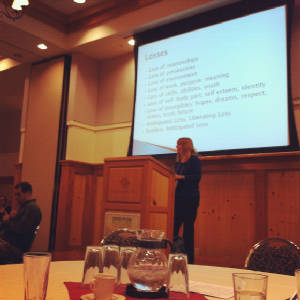|
|
| Lisa presenting in Westport, Connecticut |
|
|
| Supporting the Community After Loss |
| Delivering a Keynote in VanCouver, WA |
|
|
| Grief and Addiction |
Workshops are tailored for your specific
needs and audience. Call
Lisa (973) 985-4503 to discuss her doing a presentation or assembly program for your school, business, conference, or
organization. Listed are some of the topics that Lisa presents on: Programs for Schools - How Schools Can Support, Nurture Resilience and Foster Healthy Connections with Students Affected by Trauma, Loss
or Adverse Childhood Experiences
- Social Emotional Learning:
Creating Safe Spaces, Better Relationships with Teachers and Peers and Skills to Manage Emotions for Students and Educators
in order to be Successful and to Thrive at School and Work
- Creating
a Positive School Climate of Acceptance: Tools and Strategies and Resources to Create a Safe Space for Learning
- Every Interaction is an Intervention: Using Social Emotional Learning to
Support the Success of Students Affected by Trauma and other Adverse Childhood Experiences
- What Adults Need to Know to Support Teens Navigating Grief, Transitions & Mental Health Issues
- Suicide Prevention: Warning Signs, Interventions, Resources, Building a
Safer and Connected School Climate for All, Connecting Students to Safe Adults, How to Intervene if a Friend Talks About Suicide,
- LBGTQ Inclusive Schools: The importance of GSA's
(Gay-Straight Alliances), Supportive Educators, LGBT Inclusive Curricula, and Comprehensive Anti-Bullying Policies
- When Parents Leave Children Behind: Death, Divorce,
Abandonment, Incarceration, Deployment: How to Help these Children Succeed
- Grief, Loss and Helpful Ways to Cope: Program for School Staff to support the pre-schooler, elementary aged
student, middle schooler and high schooler
Helping
Children and Teens Through Grief:- Technology,
Grief, Suicide and Our Youth Today: The Influence of Technology on Our Children's Mental Health
- What School Professionals Need to Know about Grieving Students (2-3
hour interactive professional development workshop)
- ACE's
(Adverse Childhood Experiences) and How Adversity Affects Student's, Educators, and Parents Ability to Respond to Challenges
and Stress, Learn and Thrive
- Listening to a Grieving
Student (When they want to talk or when they don't want to talk about it).
- Helping Schools Support LGBT (Lesbian, Gay, Bisexual and Transgender) Children and Teens (School staff in-service
program)
- Helping Families Support LGBT their
Children and Teens (Parent program)
- When a Peer or
Classmate Dies (helping student cope with a loss) (K-12)
- When a Parent at School is Dying: Parent program for answering hard questions children have and ways to support resilience
and healing (K-12)
- Suicide Prevention Programs
for Schools
Bereavement in
the School-aged Child: - How Can I Help?:
When someone we care about is grieving (child, teenager or adult)
- When children's parents are incarcerated or absent from the child's life
- School Staff Grief: How to teach and work with children when the helping adults are grieving
- The Spectrum and Loss: Teachers Helping Children with Special Needs Grieve
- When a Classmate Dies: Helping Students to Grieve,
mourn and remember their young classmate
- When
a Teacher or Staff Member Dies
- When
A Parent Has Cancer or Other Illness: Supporting their Grieving Children in School
- When Parents Die: supporting staff and students
- What
Teachers and School Personnel Need to Know about Grief: Self Care while caring for the school community
- The Special Needs of Grieving Children with Special Needs: How to help
these students succeed
Programs
for Parents, PTO's and PTA's: What
Parents and Caregivers Need to Know about Children, Teens and Grief: - Raising Resilient Children and Teens in Difficult Times
- Social Emotional Parenting: How Our Past Affects our Parenting and Why it Matters: How We Can Become Less Reactive
Parents and Become More Responsive to Support Our Children in Today's World
- Safeguarding Our Children While Building Success and Nurturing Resiliency
- Helping Teens Cope after a Death of a Loved One, Friend or Other Important Person
- When A Parent Has Cancer or Other Illness: Supporting their Grieving Children
in School
- When Parents Die: supporting staff and students
- **New** When Parents Leave Children Behind: Death, Divorce, Abandonment,
Incarceration, Deployment :How to Help these Children Succeed
What Teachers and School Personnel Need to Know to Support Students in Today's World: - The Special Needs of Grieving Children with Special Needs: How to help these students succeed
- Social Emotional Learning: a workshop for educators and administrators to
learn the elements of SEL and to create better climates in the classroom, and a safer school community to support our students
- Grief, Bullying and Cyberbullying: The impact on schools, families and students
and communities
- Grief and Addictions: The Dangers of
Unacknowledged and Unexpressed Grief
- Mental Health
101: When a Student May be in Need of Additional Support, Who to go to, When to seek support and How
- Grieving in our 'Get over it Society'
- Divorce, Children and Grief: Helping Children Succeed when their World is Split in
Half
What College Faculty
Need to Know about Grief: - When a Student's Loved One Has Died: presentation for classroom, parents
and guardians and staff.
- Suicide Prevention on the
College Campus: Prevention, Intervention and Postvention
- Teens
and Suicide (staff, parents, students)
Presentations
and Assembly Programs for Students
- Coping with Grief, Loss and Other Tough Stuff (presented to pre-K through 12th grade as well as at colleges
and universities) Can be a classroom presentation, entire grade or school assembly
- Children Coping with Transitions and Change
- Grief
Stinks When You Are a Teen: How Teens Cope with Loss, Grief and Transition
- Substance Abuse, Alcohol, Cutting and other Dangerous Behaviors Won't Make Grief Go Away!
- When a Friend Dies: Teens Coping with the Death of a Friend or Peer
- Moving on to Middle School: Coping with Changes, Peer Issues, and More Responsibility
- Graduation and Transitions: What's Next and How to Cope in Healthy Ways with Changes
- College Bound Seniors: What They Need to Know about Coping, Building a Support Network and Finding and Identifying
Resources for a Healthy, Happy and Successful College Career
Programs for Hospital Professionals What Physicians Need to Know about Grief - What Physicians and Nurses Need to Know about Grief, Families and the Use
of Technology in Supporting them through grief: (caringbridge.org, facebook, video chatting, resources,etc)
What Nurses Need to Know about Grief (the children, families and co-workers)- Beyond Band-aids and Lesson Plans: What School Nurses and Educators Need
to Know about Cutting and other Self Injury
- Grief and
the Developmentally Disabled
- Grief of the Caregiver
- Grief at Work: Healing in the Workplace :Giving Permission to Professionals
to Grieve
- Grief Across the Life Spectrum
Police, Fire Departments, EMS Workers
- Police, Fire and First Aid Squads: Working with
Grief : professional grief, grief of all involved at the scene, and dealing with personal grief.
- What Teenagers Should Know about Grief, Loss and Healing
Parents of Hospitalized Children - What Happened? Coping with a Child's Hospitalization, illness, siblings,
work and everything else
- Grief of Siblings When a Child
is Ill
- Sharing Our Grief Together: Group that provides
a supportive and safe place for parents and caregivers to talk about struggles, grief, experiences, hope and resilience, that
meets in the hospital for parents coping with an ill child.
| Lisa Athan Speaking at Overlook Hospital, 8/09 |
|
|
| What Pediatricians Should Know about Grief |
|



